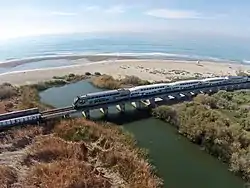Trestles Bridge
Trestles Bridge, more formally known as Railroad Bridge 207.6 or the San Mateo Creek Bridge, is a low railroad viaduct on the coast of Southern California, in northern San Diego County near its border with Orange County. The bridge lies within San Onofre State Beach and gave its nickname to the famed Trestles surfing site at that beach.[1][2][3][4][5]
Trestles Bridge | |
|---|---|
 A Metrolink train crosses Trestles Bridge in February 2015 | |
| Coordinates | 33°23′12″N 117°35′38″W |
| Carries | Amtrak Pacific Surfliner, Metrolink Orange County Line, BNSF Railway freight trains |
| Crosses | San Mateo Creek |
| Locale | northern San Diego County, California |
| Official name | Railroad Bridge 207.6 |
| Other name(s) | San Mateo Creek Bridge |
| Owner | North County Transportation District |
| Rail characteristics | |
| No. of tracks | single |
| Track gauge | 4 ft 8+1⁄2 in (1,435 mm) standard gauge |
| History | |
| Opened | 1941 |
| Rebuilt | 1992 and 2010–2012 |
| Statistics | |
| Daily traffic | 45 trains per day |
| Location | |
Usage
The bridge, carrying a single railway track, forms part of the only rail connection between San Diego and the Greater Los Angeles area. The bridge is part of the LOSSAN Corridor, the second busiest segment of railway in the United States. Approximately 45 trains per day and 2.7 million people per year travel on the bridge; it is used by Amtrak's Pacific Surfliner trains, the Orange County Line of the Metrolink commuter rail service, and freight trains on the BNSF Railway.[1][3][4][6] The bridge lies between the San Clemente Pier station to the north and the Oceanside Transit Center to the south. It crosses the San Mateo Creek.
History
A railroad first bridged the creek in this location in 1891.[2] In 1941, a wooden trestle bridge 858 feet (262 m) long was built in this location.[1][2][7] The nearby waves had already been surfed as early as 1937, and by 1951, local surfers had named the beach and its surf break "Trestles", after the bridge there.[8]
In 1992, the railway line containing the bridge was purchased by the North County Transportation District from the Atchison, Topeka and Santa Fe Railway.[3] Storms caused by the El Niño of 1998 damaged the bridge, leading a center section of the bridge 200 feet (61 m) long to be replaced by concrete and leaving separated wooden sections 100 feet (30 m) long in the south and 558 feet (170 m) long in the north.[2][7][9]
By 2007, inspectors determined that the northern segment of the bridge needed replacement.[2] Salt from the beach environment had rotted the wooden support beams, they had been damaged by fires set by beachgoers, the creosote protecting the beams had been worn away, and the bridge did not meet seismic standards.[2][3][6][7] Trains could not travel on the bridge at full speeds,[1][7] and frequent bridge maintenance was costing US$250,000 per year.[5][10] Construction began in 2010,[3][6][11] and a new concrete replacement for this bridge segment opened in 2012 at a cost of eight million dollars,[1][4] paid by federal funds from the American Recovery and Reinvestment Act of 2009.[7]
Design
In order to protect the 2012 bridge segment against corrosion, its rebar was protected by an epoxy coating and calcium nitrite was added as a corrosion inhibitor to its reinforced concrete.[12] The new concrete supports for the bridge structure are etched with letters spelling "Trestles", the nickname of the bridge.[1][4]
References
- Rojas, Rick (May 14, 2012), "New Trestles bridge opens: Much of the original, 1941 wooden structure near the famed San Diego County surf spot has been replaced – under budget and six months ahead of schedule – with reinforced concrete", Los Angeles Times, p. AA3.
- Volzke, Jonathan (April 29, 2009), "Trestles Losing its Trestles", San Clemente Times.
- San Mateo Creek Bridge Replacement at Trestles Beach Fact Sheet, North County Transportation District, April 2011, retrieved May 15, 2012.
- Swegles, Fred (May 14, 2012), "Gleaming new bridge adorns iconic Trestles surf spot", Orange County Register.
- Anton, Mike (September 6, 2009), "Trestles is losing its race with time: Most of the old bridge wooden bridge, a doorway to one of the coast's best surf breaks, will soon be replaced with concrete", Los Angeles Times.
- Joyce, Ed (August 31, 2010), Concrete To Replace Wooden Trestles Bridge At San Onofre: Salt Air, Fires, Vandalism Take Toll On 70-Year-Old Structure, KPBS.
- Sisson, Paul (April 17, 2009), SAN ONOFRE: Iconic railroad bridge in for a change at Trestles. Only 100 feet of original wooden structure will remain.
- Pezman, Steve (2006), "Capers in the key of "T": Trestles memories", in Diamond, Paul (ed.), Surfing's Greatest Misadventures: Dropping In on the Unexpected, Casagrande Press, pp. 139–156, ISBN 9780976951605.
- "First part of work to repair creek mouth nears completion", The San Diego Union-Tribune, December 22, 1998.
- Trestles Bridge Improvements, TransNet, retrieved May 15, 2012.
- Hawkins, Robert J. (August 31, 2010), "Trestles Bridge nearing its end", The San Diego Union-Tribune.
- Smith, B. G.; Creveling, M.; Teig, J. W. (2011), "Sustainable Concrete Mix Designs for 100-year Service Life for Bridges in San Diego County Coastal Environments", Coastal Engineering Practice: 184–197. See in particular example 4.2, San Mateo Creek Rail Bridge 207.6, pp. 195–196.